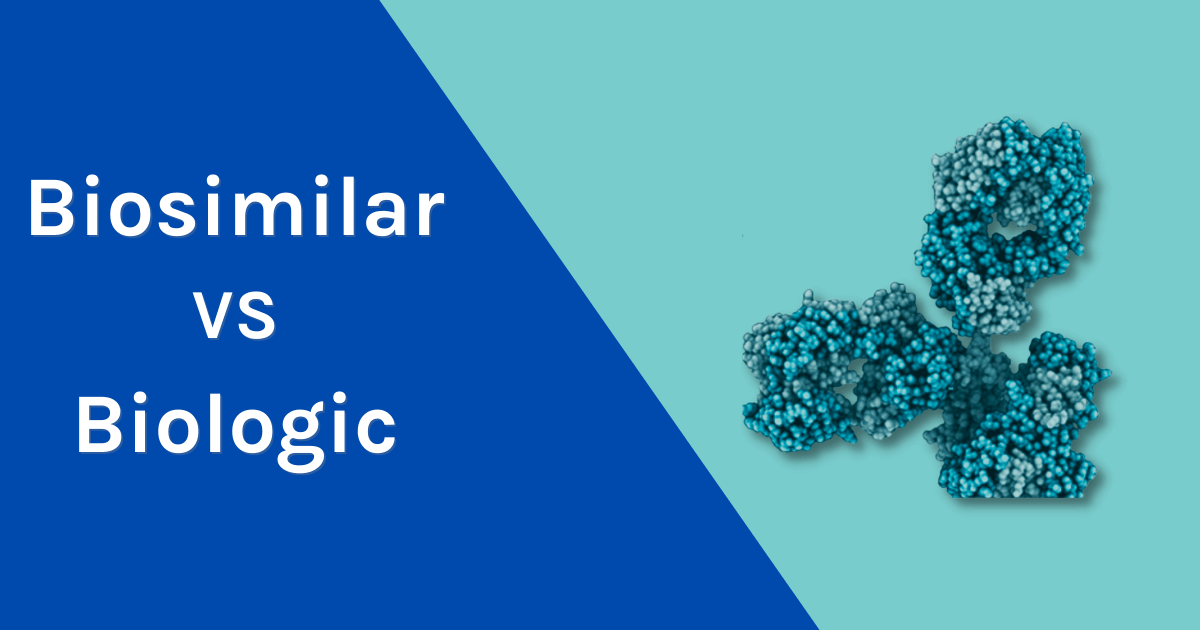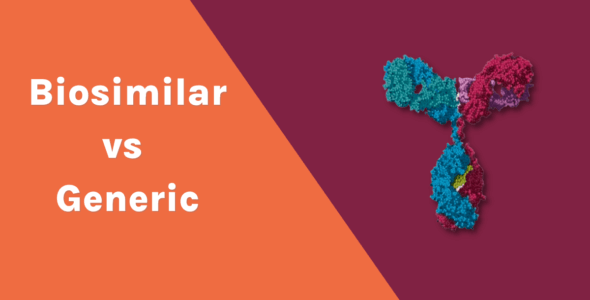What is a biologic drug? Biologic vs Biosimilar
Table of contents
Biologic drugs provide more treatment options for patients who have serious health conditions or who have previously had no available treatment options. Biologics are produced from living organisms but just like conventional drugs, all biologic drugs and biosimilars must be approved by the Food and Drug Administration (FDA) for safety and effectiveness. The most well know biologic is the brand name drug Humira, active ingredient adalimumab, used for rheumatoid arthritis, psoriatic arthritis, psoriasis, ulcerative colitis, and ankylosing spondylitis. But what is a biologic drug? Let’s answer this question for you and find out more.
What is a biologic drug?
Biologics or biological medicines originate from living cells, such as humans, animals, or microorganisms using biotechnology, whereas chemically derived drugs are created in laboratories. Chemically derived or traditional drugs are described as small molecule drugs. Biologic drugs on the other hand are much larger in size, containing more complex molecules, making them challenging and costly to make. The growth of the cells in biologic medications can take several weeks and requires constant monitoring. The protein that makes up the drug is extracted and purified until the final biologic drug is obtained.
Biological products include a wide range of products including:
- Vaccines
- Blood components
- Gene therapy
- Tissues
- Proteins, like monoclonal antibodies and cell signaling proteins
The manufacturing process of biological drugs makes it is impossible to guarantee that each batch of a biologic drug will be identical to the last, which means every dose of a biologic medicine has slight variations.
What conditions can biological medications treat?
Biologic therapies can be used to treat a number of different conditions such as:
- Rheumatoid arthritis
- Crohn’s disease
- Ankylosing spondylitis
- Cancer
- Psoriasis
Examples of a biologic and biosimilar drugs
| Original biologic name (reference product) | Biosimilar name | Manufacturer | FDA approval date |
|---|---|---|---|
| Neupogen (filgrastim) Manufacturer: Amgen FDA approval date: 2002 | Zarxio Nivestym Releuko | Sandoz Pfizer | 2015 2018 |
| Remicade (infliximab) Manufacturer: Janssen FDA approval date: 1998 | Inflectra Renflexis Ixifi Avsola | Calltrion Samsung Bioepis Pfizer Amgen | 2016 2017 2017 2019 |
| Enbrel (etanercept) Manufacturer: Amgen FDA approval date: 1998 | Erelzi Eticovo | Sandoz Samsung Bioepis | 2016 2019 |
| Humira (adalimumab) Manufacturer: Abbvie FDA approval date: 2002 | Amjevita Cyltezo Hyrimoz Hadlima Abrilada Hulio Yusimry | Amgen Boehringer Ingelheim Sandoz Samsung Bioepis Pfizer BGP Pharma ULC (Viatris) Coherus BioSciences, Inc. | 2016 2017 2018 2019 2019 2020 2021 |
| Avastin (bevacizumab) Manufacturer: Genentech FDA approva datel: 2004 | Mvasi Zirabev Alymsys | Amgen Pfizer Amneal | 2017 2019 2022 |
| Herceptin (trastuzumab) Manufacturer: Roche FDA approval date: 1998 | Ogivri Herzuma Ontruzant Trazimera Kanjinti | Mylan and Biocons Celltrion Samsung Bioepis Pfizer Amgen | 2017 2018 2019 2019 2019 |
| Neulasta (pegfilgrastim) Manufacturer: Amgen FDA approval date: 2002 | Fulphila Udenyca Ziextenzo Nyvepria | Mylan and Biocons Coherus Biosciences Sandoz Pfizer | 2018 2018 2019 2020 |
| Rituxan (rituximab) Manufacturer: Genentech and Biogen FDA approval date: 1997 | Truxima Ruxience Riabni | Celltrion Pfizer Amgen | 2018 2019 2020 |
| Lucentis (ranibizumab) Manufacturer date: Genentech FDA approval: 2006 | Byooviz | Samsung Bioepis | 2021 |
| Lantus (insulin glargine-yfgn) Manufacturer date: Sanofi FDA approval: 2000 | Rezvoglar Semglee | Eli Lilly Mylan | 2021 2021 |
| Retacrit (epoetin alfa-epbx) Manufacturer date: Pfizer FDA approval: 2018 | Epogen | Amgen | 2021 |
According to figures from Statista, the top 10 best-selling biologics worldwide in 2020 were:
- Humira (adalimumab) – used to treat rheumatoid arthritis, psoriatic arthritis, psoriasis, ulcerative colitis, and ankylosing spondylitis
- Keytruda (pembrolizumab) – used to treat a range of cancers
- Eylea (aflibercept) – a prescription medication given to adults to treat a range of eye conditions
- Dupixent (dupilumab) – an injectable medicine used to reduce inflammation
- Opdivo (nivolumab) – used to treat melanoma skin cancer
- Avastin (bevacizumab) – a cancer medication that stops tumors from creating their own blood supply, starving them of blood, oxygen, and nutrients
- Enbrel (etanercept) – used to treat autoimmune conditions by reducing inflammation
- Rituxan (rituximab) – a prescription medication used to treat some types of cancer and certain autoimmune diseases
- Herceptin (trastuzumab) – used to treat cancers called HER2 (human epidermal growth factor receptor 2) overexpressing cancers
- Remicade (infliximab) – a medication used to treat specific autoimmune diseases, and some similar diseases
What are the side effects of biologic drugs?
Common side effects of biologic drugs include:
- Injection site reactions – redness, itching, swelling, pain
- Nausea, upset stomach
- Headaches – more common in people who use biologic drugs
- Infection – biologic meds raise your risk of infection because they weaken your immune system
- Reactivation of infections – biologic medicines can cause the return of conditions like hepatitis B or tuberculosis (TB) if you have had them before
Less Common Side effects of biologics include:
- Central nervous system issues – sudden vision problems, numbness, or tingling
- Heart problems
- Shortness of breath or sudden heart failure is possible
- Some studies have suggested that biologic medicines may slightly raise your risk of certain types of cancer
- Liver problems – symptoms of liver issues include yellowing of the skin or eyes
- New joint pain – even though biologics are used to treat arthritis, they can sometimes cause new joint pain
Serious reactions are rare but may include:
- Trouble breathing
- A severe allergic reaction
- Chest pain or tightness
- Fever or chills
- High or low blood pressure
- Swelling of the face and hands
Your health care provider can share more information about biologics and if they’re the best treatment for you.
Medically reviewed
A medical professional has reviewed this article.


Jamie Winn, PharmD
Jamie Winn, PharmD
Dr. Jamie Winn received his Doctor of Pharmacy in 2002 from the University of South Carolina College of Pharmacy, Columbia, SC. Jamie is a medical reviewer for NiceRx.



